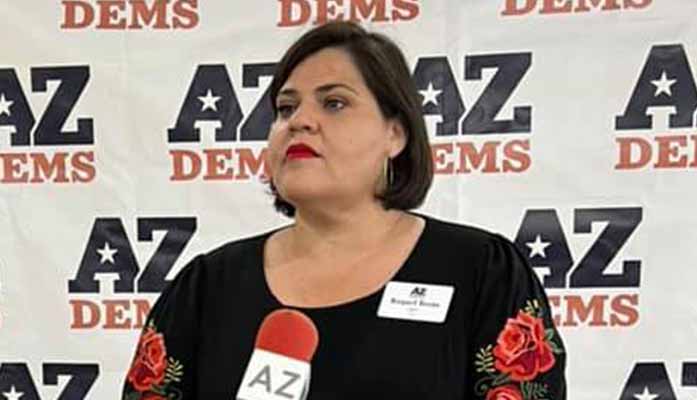
by Daniel Stefanski | Apr 10, 2023 | News
By Corinne Murdock |
Raquel Terán (D-LD30), the State Sen. Minority Leader until February, launched her congressional campaign on Wednesday.
Terán is gunning for the seat currently belonging to Rep. Ruben Gallego (D-AZ-03), who announced his Senate bid in January.
Terán’s initial campaign video cited her past leadership roles within the Democratic Party and the legislature, as well as her stint working at Planned Parenthood.
“Arizona is facing many challenges. Our housing prices are out of control. Our reproductive freedoms, including legal and safe abortion, are under attack. Our democracy is in jeopardy,” said Terán in the video. “The super wealthy continue to rig the system against our working families, and we desperately need comprehensive immigration reform.”
Terán repurposed her state senate campaign website into her congressional campaign website.
According to records available via the Department of Justice (DOJ) Foreign Agents Registration Act (FARA), Terán received funds for her congressional campaign, “Raquel Terán For Congress,” as early as 2020 and 2021: $100 on December 1, 2020, and another $100 on January 2, 2021. Both amounts came from Felipe Carlos Benitez Rojas, who runs a political consultancy firm called Benitez Strategies.
Terán hadn’t announced a run at the time.
This latest announcement from Terán reflects a quick succession of career shifts to position herself for the congressional bid. Most recently, Terán stepped down as Senate Minority Leader in late February. State Sen. Mitzi Epstein (D-LD12) took over Terán’s leadership role.
Terán became the Arizona Democratic Party (ADP) chair in early 2021. Then that September, she advanced from the House to the Senate by taking over the seat from former State Sen. Tony Navarrete, who was arrested for alleged sexual abuse of a male minor.
Terán was appointed State Senate Minority Leader for this session in November. Then in December, she gave up the ADP chairmanship.
Terán has also been carving out a political pathway that differs from the state’s top leader. She opposed Gov. Katie Hobbs’ pick for ADP chair, shortly after she’d stepped down for the role. Hobbs backed Maricopa County Board of Supervisors member Steve Gallardo.
Prior to ascending into a leadership role in politics, Terán served as a political activist with a major nonprofit backed by leftist dark money networks, Mi Familia Vota, as well as Promise Arizona. Terán joined Mi Familia Vota around 2006 to combat statewide efforts to combat illegal immigration.
Terán claimed victories over former Sheriff Joe Arpaio, former President Donald Trump, and gubernatorial candidate Kari Lake.
Corinne Murdock is a reporter for AZ Free News. Follow her latest on Twitter, or email tips to corinne@azfreenews.com.

by Daniel Stefanski | Apr 10, 2023 | News
By Daniel Stefanski |
Democrat Governor Katie Hobbs vetoed a bill that would have enhanced protections for newborn infants, angering Arizona Legislative Republicans who sent the legislation to her Office.
Hobbs vetoed SB 1600, sponsored by Senator Janae Shamp, which would have required “any infant who is born alive to be treated as a legal person under Arizona laws and have the same rights to medically appropriate and reasonable care and treatment.” The bill also would have required “any health care professional present, when an infant is born alive, to take all medically appropriate actions to preserve the life and health of the born alive infant.”
Hobbs explained her reasoning for the veto in a letter to Arizona President Warren Petersen, writing: “The bill is uniformly opposed by the medical community and interferes with the relationship between a patient and doctor. It’s simply not the state’s role to make such difficult medical decisions for patients. As a candidate I promised to veto any bill that interferes with the reproductive rights of Arizonans. As Governor, I intend to make good on that promise.
But the bill sponsor, Senator Shamp, wasn’t having any of the governor’s justification for her veto. Shamp released her own statement shortly after the action, saying, “Governor Hobbs has refused to carry out the scheduled execution of death row inmate, Aaron Gunches, in order to preserve his life after being convicted of a brutal murder. It’s sickening that she doesn’t feel the same about keeping innocent babies alive. In reality, death by neglect is murder. Healthcare professionals should be required to take action to preserve the life and health of a living, breathing baby. Appropriate medical care ranges from the most invasive to comfort care, and under no circumstances should that ever not be offered. Quite frankly, it’s atrocious that I would even need to write legislation to protect our state’s most vulnerable lives.”
During the legislative process, SB 1600 first passed the Senate Health and Human Services Committee with a party-line vote of 4-3, and then the full chamber by a tally of 16-13 (with one Democrat member not voting). The bill was then transmitted to the House, where the Health and Human Services Committee approved its clearance 5-4. The full chamber then gave the legislation a green light with a 32-26 vote (with two Democrat members not voting). Democrat Representative Lydia Hernandez was the lone member of her party to side with Republicans in voting for this bill.
Before the governor’s veto, representatives from the American Civil Liberties Union of Arizona, Arizona National Organization for Women, State Conference NAACP, and Planned Parenthood Advocates of Arizona (among others) registered their opposition to the bill; while representatives from the Arizona Catholic Conference and Center for Arizona Policy urged legislators to support the proposal.
Daniel Stefanski is a reporter for AZ Free News. You can send him news tips using this link.

by Daniel Stefanski | Apr 9, 2023 | News
By Daniel Stefanski |
An attorney for the Friends of David Schweikert Committee filed a Motion to Disqualify Judicial Officer for Cause in the Maricopa County Superior Court.
The motion, submitted to Presiding Judge Joseph C. Welty, pertains to the case assigned to Judge John H. Hannah Jr. The case, Hammon v. Friends of David Schweikert, involves a defamation allegation during the 2022 Arizona primary campaign during Schweikert’s contentious battle with challenger Elijah Norton.
The defendants filing the motion – David and Joyce Schweikert, Friends of David Schweikert, and Americans for Accountability in Leadership – took this action “based on newly discovered information that indicates a political preference on the part of Judge Hannah that Defendant Congressman David Schweikert cease to be a member of Congress.”
Schweikert’s attorney, Tim LaSota, wrote in the motion that he “first received information about various political donations that Judge Hannah made that, based on their nature, require disqualification. Specifically, Judge Hannah contributed money in September of 2019 to Hiral Tipirneni, who was at that time running for the congressional seat held by David Schweikert. In addition, Judge Hannah has given money to an entity called Movement Voter PAC, most recently in September 2020. According to the left-wing site ‘Blue Tent,’ Movement Voter PAC is one of the premier groups to give money to if one wanted to ‘help Democrats Win in Arizona this Year,’ and specifically, ‘we recommend giving to the Movement Voter Project Arizona Fund.’ Judge Hannah also contributed $50.00 to a group called ‘One Nation United,’ dedicated to ridding Congress of Republicans, or at least diminishing their numbers such that the Democratic Party Controls Congress.”
The motion states that “Judge Hannah never disclosed his direct political opposition to Congressman Schweikert.” The filing argues, “To avoid appearances of impropriety, judges have obligations of disclosure and candor, including disclosing any reason why they might be perceived as biased on the case (or they actually are), and any sources of information outside the evidence that has been presented to them, as well as giving parties the opportunity to rebut such evidence. Canon 2.11 provides that ‘[a] judge shall disqualify himself or herself in any proceeding in which the judge’s impartiality might reasonably be questioned, including but not limited to the following circumstances: [t]he judge has a personal bias or prejudice concerning a party or a party’s lawyer…’” It goes on to make the case that “Judge Hannah has made no mention of these specific anti-Schweikert and general anti-Republican political activities during the course of this matter.” And the filing adds, “Judge Hannah’s undisclosed history of backing candidates and causes directly opposed to Congressman Schweikert merits disqualification.”
The Friends of David Schweikert Committee provided the following quote to AZ Free News on the revelations contained in the recently filed motion: “Like all Arizonans, we trust that all judges will take all appropriate steps to avoid bias and impropriety or the appearance of bias or impropriety. At the same time, we would hope that all members of the judiciary will ensure their political activities and donations do not undermine the public’s trust in our judicial system or bring it into disrepute.”
LaSota’s motion makes the point that “Judges will typically recuse at the slightest notion of improper conduct or actual bias, and at the minimum they will disclose issues of ethical conern. When judges fail to do so, they risk stepping outside their anticipated roles as neutral and respected decision-makers and into the role of a partial advocate, which imperils our entire system of justice.”
Former Arizona Legislator Vince Leach would be in agreement of that statement. He told AZ Free News that “After reading the Motion to Disqualify Judicial Officer for Cause, it is disappointing and disturbing that a judge hearing a case involving a United States Congressman would not have seen it proper to recuse himself from this case. Our court system is already looked upon as bifurcated at best, and this does not help that appearance. Arizonans expect fair and unbiased judges. Steps should be taken to make sure that all relevant ethics standards are applied to this judge as warranted through a thorough investigation.”
The motion states that “the Comment to (Ariz. R. Sup.Ct. 81) Canon 3 provides that ‘[a]n independent judiciary requires that judges decide cases according to the law and facts, without regard to whether particular laws or litigants are popular or unpopular with the public, the media…Confidence in the judiciary is eroded if judicial decision making is perceived to be subject to inappropriate outside influences.’ Judge Hannah hearing this case of action is precisely the type of situation that Canon 3, and the other legal authorities, warn of.”
Daniel Stefanski is a reporter for AZ Free News. You can send him news tips using this link.

by Daniel Stefanski | Apr 7, 2023 | News
By Daniel Stefanski |
Another legislative attempt to give Arizona law enforcement more space to do its job is meeting resistance from Democrats.
SB 1047, sponsored by Senator John Kavanagh, “expands the criminal classifications of third degree criminal trespass and refusing to aid a peace officer,” according to the purpose provided by the State Senate. The bill “classifies as third degree criminal trespass, knowingly entering or remaining at the site of a natural disaster, a traffic accident or another type of accident, a civil disturbance or an active law enforcement investigation, if there is active law enforcement intervention into criminal activity at the site and law enforcement communicates that public access is restricted.”
The bill also “classifies, as refusing to aid a peace officer, refusing to remain at a reasonable distance, as determined by the peace officer, from the location where the peace officer is actively intervening in a dangerous or potentially violent criminal occurrence with another person who is threatening or agitated or who appears to be emotionally unstable.”
In March, SB 1047 passed the Senate with a party-line 16-12 vote – with two members not voting (Gonzales and Diaz). It had previously cleared the Senate Committee on Military Affairs, Public Safety, and Border Security with a 4-3 vote, and the Rules Committee with a 4-3 tally.
After the Senate voted to approved SB 1047, the House wasted no time to start its consideration of this legislation. The House Committee on Military Affairs & Public Safety passed the bill – also along party lines – with an 8-7 vote.
Legislative Democrats have strongly opposed this bill throughout the session. The Arizona Senate Democrats Caucus tweeted, “Did you know? SB 1047 would reduce police accountability.”
The Arizona House Democrats also shared similar concerns with the bill this week, writing, “Sen. John Kavanagh’s unconstitutional attempt last year to prevent filming police activity never went into effect because no attorneys would defend it. So now he’s back in House Public Safety Committee with SB 1047 which would prevent observing police activity.”
Representatives from the Arizona Association of Counties and the Arizona Police Association supported SB 1047, while representatives from the State Conference NAACP, Arizona Attorneys for Criminal Justice, and the American Civil Liberties Union of Arizona opposed its passage.
The bill now awaits its fate in the Arizona House of Representatives.
Daniel Stefanski is a reporter for AZ Free News. You can send him news tips using this link.

by Daniel Stefanski | Apr 6, 2023 | News
By Daniel Stefanski |
As many California residents head east to Arizona in response to policies they find objectionable, Maricopa County appears to be taking a leap toward adopting some of those same policies.
The Maricopa Association of Governments (MAG) recently contracted with a California-based consulting firm to “identify and evaluate new and available ozone precursor control measures that could be implemented within the nonattainment area” – which is an “eight-hour ozone boundary for the 2015 ozone standard (2015 National Ambient Air Quality Standard). According to the Final Report from the consulting firm, the area runs north to south from the Yavapai County line to Hunt Highway; and west to east from 499th Avenue to the Gila and Pinal County lines.
One of the geneses of this report stems from a little-discussed published rule from the U.S. Environmental Protection Agency (EPA) in fall 2022, which moved “the region up the severity ladder for ozone pollution, reclassifying the region from ‘marginal’ to ‘moderate’ nonattainment for the ozone pollution standard.
In a press release dated September 2022, MAG revealed that “in 2015, the EPA tightened the ozone pollution standard from 75 parts per billion to 70 parts per billion,” and that the region encompassing “Maricopa County and portions of Pinal County missed that deadline.”
MAG wrote in the September release, that “the moderate nonattainment area classification requires new actions and measures, including:
- New control measures to reduce the types of emissions that create ozone.
- Emission offset requirement for new, large facilities locating in the nonattainment area and major expansions to large, existing facilities, which are required to offset every ton of emissions by 1.15 tons.
- Contingency measures (i.e., measures to be deployed if the nonattainment area does not meet yearly emission reduction milestones).
- Potential emission controls for intrastate facilities or other emission sources located outside the Phoenix-Mesa nonattainment area.”
Enter the consultant’s Final Report this spring, which suggested “approximately 50% reduction in nonattainment area anthropogenic NOx and VOC emissions” in order to bring the region into compliance with the EPA’s standard by an August 3, 2024, deadline. An Arizona Department of Environmental Quality Division Director recently admitted that “Maricopa County businesses and residents have done a fantastic job of reducing ozone pollution by 12.5 percent since 2000.” But Maricopa County would have to exponentially and substantially pick up the pace of slashing emissions in just over one year – compared to the two-plus decades of work to cut pollution by 12.5 percent. And that is likely impossible.
But MAG is still planning to move forward with this plan, and to meet this deadline, it included suggested measures to reduce ozone in the Maricopa Nonattainment Area to meet Clean Air Act requirements related to the 2015 ozone standard. Some of the suggested measures include adopting standards similar to California like banning the internal combustion engine, banning gas appliances, and a host of regulations on various business activities.
There is a tight turnaround for approval of these drastic measures to cut emissions in Maricopa County. Before the end of April, the “MAG Regional Council may approve the Draft Suggested List of Measures” after receiving recommendations from the MAG Management Committee. Then, over this summer, “implementing entities provide commitments to implement measures, or reasoned justification for non-implementation, to MAG for inclusion in a nonattainment area state implementation plan submission to EPA.”
The EPA guidance instructs that “states should consider all available measures, including those being implemented in other areas, but must adopt measures for an area only if those measures are economically and technologically feasible and will advance the attainment date or are necessary for reasonable further progress.” According to the March 6 Draft Suggested List of Measures to Reduce Ozone in the Maricopa Nonattainment Area, “if an entity decides that a measure on the Suggested List is not available or feasible for implementation, the entity will provide a justification for why the measure is not available or feasible.”
Cities, towns, and Maricopa County may soon be forced to decide between complying with extremely onerous measures to bring down a tremendous amount of emissions in a hurry or losing out on a generous offering of federal dollars (along with financial penalties that could be levied against those jurisdictions), setting up a potential battle over federalism that will determine Maricopa County’s (and eventually Arizona’s) commitment to its libertarian and freedom-minded roots or deviation to California’s environmentalism policies and politics.





